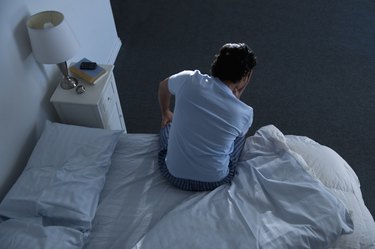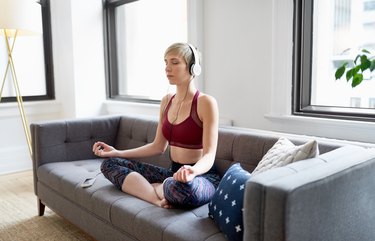
There are certain situations when you might expect a pounding heart — before a big public speech, during a scary movie or after a tough cardio workout, for example. But waking up with heart palpitations at night can be alarming.
Though startling, occasional heart palpitations — which can feel like your heart's racing, pounding or fluttering in your chest — aren't usually a sign of something serious. But if the palpitating persists, it could indicate an underlying health problem.
Video of the Day
Video of the Day
Here, John Higgins, MD, a cardiologist with UTHealth Houston, explains why a racing heart might wake you up at night and when you should see your doctor.
Warning
If your heart palpitations are accompanied by dizziness, confusion, lightheadedness, chest pain or pressure, shortness of breath or unusual sweating, call 911 immediately, as these may be signs of a more serious medical issue, according to the Cleveland Clinic.
1. You Have Low Blood Sugar
Low blood sugar — also called hypoglycemia — can affect your heartbeat.
Here's why: When your blood glucose levels drop too low, this prompts your body to release epinephrine (aka adrenaline), the "fight-or-flight" hormone, according to the American Diabetes Association (ADA). And this adrenaline boost produces a pounding heart.
Other symptoms of low blood sugar may include, per the ADA:
- Feeling shaky, nervous or anxious
- Sweating, chills and clamminess
- Irritability or impatience
- Lightheadedness or dizziness
- Hunger
- Nausea
- Color draining from the skin (pallor)
- Sleepiness, weakness or lack of energy
- Headaches
- Nightmares
Warning
When your blood sugar dips dangerously low, your brain becomes starved of glucose and can no longer function properly, per the ADA. As a result, you may experience symptoms such as blurred vision, difficulty concentrating, confusion, slurred speech, numbness and drowsiness. Seek immediate medical treatment for these symptoms, as they may lead to seizures, coma and, in rare cases, even death.
Fix it: To get your blood sugar back up to normal, you can sip juice, suck on a hard candy or take glucose tablets, Dr. Higgins says.
Similarly, the ADA recommends consuming 15 grams of carbs and checking in to see how you feel after 15 minutes.
2. It's a Medication Side Effect
Nightly heart palpitations could be a byproduct of a medicine you're taking. Certain medications may affect the heart's ability to contract and relax or produce extra beats, Dr. Higgins says.
These drugs include the following, according to the Cleveland Clinic:
- Asthma inhalers
- Decongestants
- Beta blockers
- Thyroid and antiarrhythmic medications
- Some antidepressants
- Some cough/cold medicines
- Some herbal and nutritional supplements
Fix it: If you suspect your racing heart is a side effect of your medication, talk to your doctor immediately. They may be able to adjust the dose or prescribe a different drug.
3. You Have Stress or Anxiety
Your mental health could be meddling with your heart at night. Yep, stress and anxiety can amplify your heart rate.
That's because when you're stressed or anxious, your body switches into a state of fight or flight, which triggers the release of epinephrine, Dr. Higgins says. And this results in elevated heart rates, premature ventricular contractions (PVCs) (extra heartbeats that begin in the lower chambers of your heart) and premature atrial contractions (PACs) (extra heartbeats that start in the upper chambers of your heart), he explains.
Fix it: Prioritize stress management. Dr. Higgins recommends deep breathing, meditation, progressive muscle relaxation and yoga to slash stress levels.
And if your anxiety and stress continue to wreak havoc on your heart and mental health, consider talking to a therapist.
4. It's Something You Ate
Believe it or not, what you put on your plate can sometimes produce heart palpitations at night.
"Foods high in carbohydrates can cause your blood sugar levels to go way up, and this can cause the release of insulin and stress hormones, which can speed up heart rate," Dr. Higgins says.
In fact, "chronically elevated blood sugar levels are associated with increased rates of atrial fibrillation [an irregular, often very rapid heart rhythm] too," he adds.
Similarly, "eating foods with a lot of monosodium glutamate (MSG), nitrates or sodium can bring on palpitations too by increasing blood pressure and stress on the heart," Dr. Higgins says.
What's more, drinking too much alcohol can also affect your ticker. Excessive booze can lower your magnesium levels, which are associated with ventricular tachycardia (i.e., rapid heart rate), Dr. Higgins says.
Fix it: Dr. Higgins shares the following strategies to keep your food from spiking your heart rate:
- If you have heart palpitations after eating certain foods, consult with your doctor, who can assess you for food sensitivities. Avoid these foods in the meantime.
- Don't eat a big meal high in fats, carbs or salt just before bed, and limit late-night snacks like chocolate.
- Dine out less and prepare your own meals more, so you can monitor salt levels.
- Limit alcohol intake and drink one glass of water for every glass of alcohol.
5. You’re Experiencing Hormonal Changes
Certain fluctuations in your hormones could have an effect on your heart rate.
For example, during menopause, people may experience a drop in estrogen levels and a rise in follicle stimulating hormone (FSH), both of which can overstimulate the heart and cause increased amounts of PVCs and PACs, Dr. Higgins says.
Palpitations are especially common during nightly hot flashes due to fluctuating high and low levels of estrogen, he adds.
Likewise, hormonal changes in pregnancy can typically present as a pounding heart too, which is usually harmless, according to the Cleveland Clinic.
Fix it: Luckily, a racing heart related to pregnancy is only temporary and should subside once you give birth.
But if your hammering heart rate and other menopausal symptoms are reducing your quality of life, talk to your doctor about treatment for hormone withdrawal, including topical creams, that may help you find some relief, Dr. Higgins says.
6. You’re Dehydrated
Haven't hydrated enough today? A pounding heart at night may be a sign you're not getting enough water during the day.
Indeed, "dehydration causes the heartbeat to speed up," Dr. Higgins says. That's partly because dehydration can disrupt your electrolytes, i.e., minerals in the body that regulate your heart's rhythm, per the Cleveland Clinic.
For example, dehydration is associated with low potassium levels, which can cause increased PVCs and PACs, Dr. Higgins says.
Fix it: To stay healthily hydrated, sip on water throughout the day. Aim to see a light straw-colored yellow in the toilet when you pee, Dr. Higgins says.
And as a general guideline for how much water you should drink per day, try this simple equation:
Body weight (in pounds) ÷ 2 = minimum ounces of H2O you should sip a day
7. You Have a Fever
A fast heart rate could also be a secondary effect of a fever.
"When you burn up more energy than usual and have a fever, your heart rate increases and your blood pressure can drop, both of which can cause palpitations like increased PACs and PVCs," Dr. Higgins says.
Additionally, certain infections that instigate a fever — like viral infections — can slow the heart rate down abnormally, which can also create palpitations, dizziness and pounding in your chest, he adds.
Fix it: Take Tylenol, stay well hydrated and if your fever persists or rises above 103 degrees Fahrenheit, seek immediate medical care, Dr. Higgins says.
8. You’re Sleep-Deprived
A lack of sleep can sabotage your heart health in many ways, and palpitations are just one symptom.
"Sleep deprivation causes an increased level of stress hormones, which can bring on tachycardia, PVCs and PACs," Dr. Higgins says.
The worst part? Waking up with a racing heart just further zaps your zzzs and triggers more stress.
Fix it: Practice healthy sleep hygiene and aim to get between seven and nine hours of slumber each night, Dr. Higgins says.
And remember to relax for 24 hours after a hard workout, he adds. Giving yourself adequate recovery time after gym sessions can help prevent overtraining, which may trigger sleep problems too.
Was this article helpful?
150 Characters Max
0/150
Thank you for sharing!
Thank you for your feedback!
Is this an emergency? If you are experiencing serious medical symptoms, please see the National Library of Medicine’s list of signs you need emergency medical attention or call 911.


